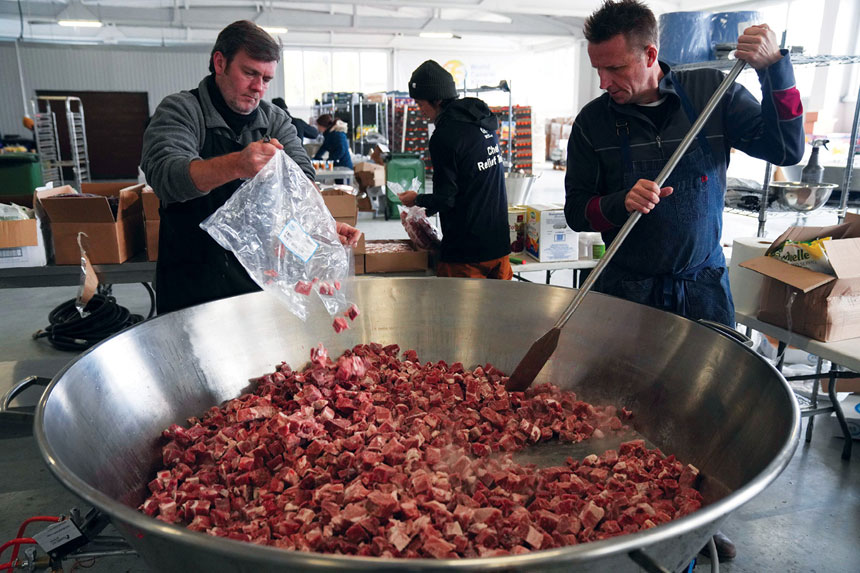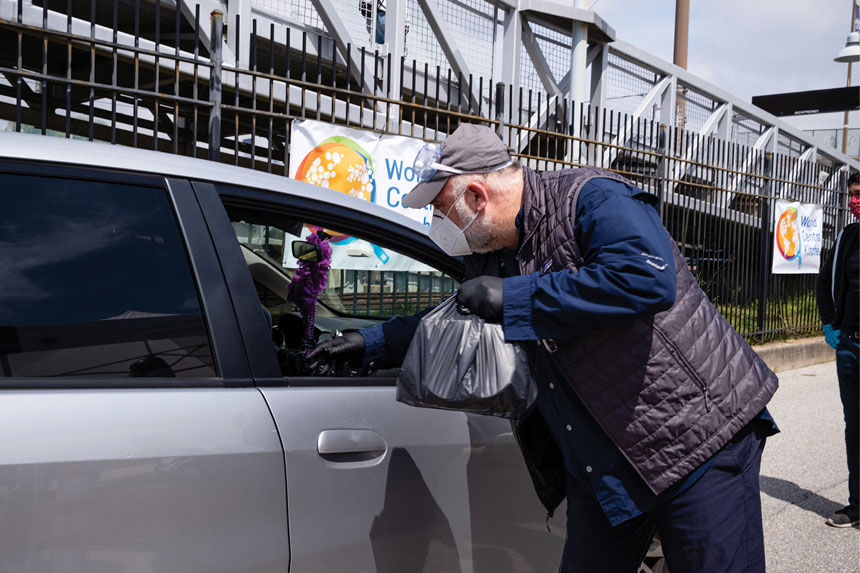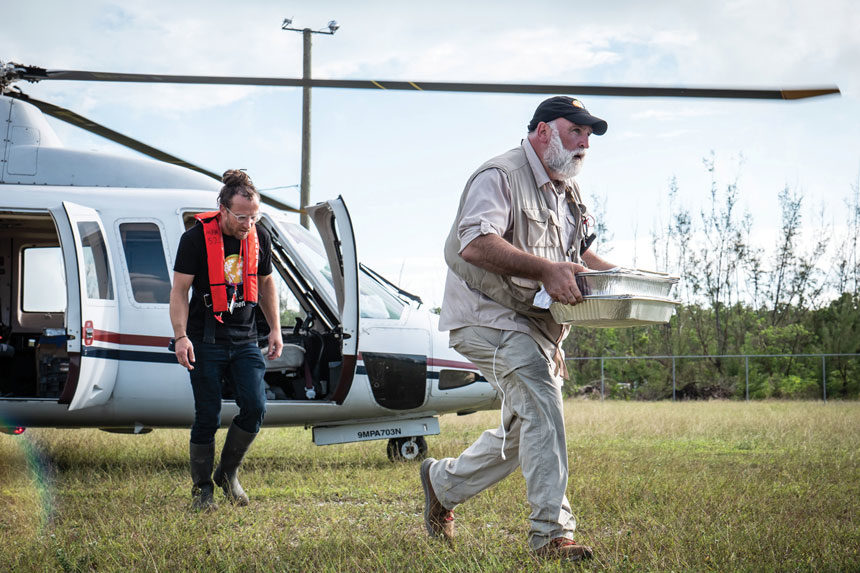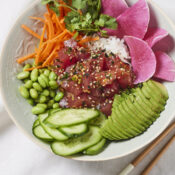This story, like many immigrants’ success stories, starts with a young man arriving in New York with a set of cooking knives and $50, which he would parlay into a nationwide empire of award-winning restaurants. Not content with personal success, he then founded the World Central Kitchen, a nonprofit that, since 2010, has served more than 200 million hot meals to people affected by natural disasters and other crises around the globe.
José Andrés, 53, is a burly man with a booming Spanish-accented voice, an ebullient personality, and a fondness for wearing utility vests, baggy cargo pants, and baseball caps. “Let’s go” is a favorite expression, seeming to reflect his boundless energy and drive. Yet, Andrés is a modest man who prefers talking about anything other than himself and dislikes being called a celebrity chef. “I am not a celebrity. I’m a cook,” he says simply. “I’ve been given the opportunity to feed the few, but that same know-how allows me to sometimes feed the many.”
Yes, he uses the simple word cook to describe himself, but he is also an internationally recognized culinary innovator, author of several cookbooks, a television personality (Iron Chef America), and the only chef in the world who has both a two-star Michelin restaurant (the reserved-months-in-advance Minibar by José Andrés) and four Bib Gourmands. Chef Éric Ripert, of New York’s acclaimed restaurant Le Bernardin, describes Andrés as “probably the most creative chef in the world today.”
The list of his awards and acknowledgments could scarcely fit into this article, but just to name a few: Andrés was twice honored in Time magazine’s “100 Most Influential People,” received the National Humanities Medal in 2015 for his disaster relief work, and was nominated for the Nobel Peace Prize in 2019. And now there’s a film about Andrés and his World Central Kitchen, We Feed People, directed by Ron Howard. (You can find it streaming on Disney+ and Hulu.)
Born in Spain, Andrés learned the craft of cooking from his parents, spending many Sundays helping his father make paella. At 15, he enrolled at a culinary and hospitality school — Escola de Restauració i Hostalatge — in Barcelona before apprenticing in the wildly creative kitchen of chef Ferran Adrià’s three-Michelin-star restaurant El Bulli. During a stint in the Spanish Navy aboard the four-masted barquentine Juan Sebastián de Elcano, he sailed into New York Harbor. Smitten by the city, he vowed that one day he would return.
In 1991, at the age of 21, he did, landing a job at one of Manhattan’s most distinguished Spanish restaurants, Eldorado Petit. Andrés moved to Washington, D.C., in 1993 to lead the kitchen of new tapas restaurant Jaleo. That same year, he cofounded the restaurant collective ThinkFoodGroup, which now includes more than 30 restaurants in eight states and the Bahamas, including Washington, D.C.’s hugely popular Minibar by José Andrés, a tasting-counter–cum-chef’s-table. Its multi-course tasting menu consists of a series of tiny, inventive dishes that have been raved about by food critics nationwide: “[W]e were stunned at the mastery of every bite, which each brought together creativity and deliciousness,” wrote Washingtonian magazine in 2019 when it ranked Minibar the number one restaurant in D.C.
After arriving in Washington, the young entrepreneur also donated time and resources to an organization called D.C. Central Kitchen, a local charity that feeds the capital’s homeless and residents in need, as well as providing hands-on culinary training. Here, he witnessed firsthand the devastating effects of food insecurity and began developing his own philosophy that food justice should be part of our national security conversation.
A seminal event, the catastrophic earthquake that struck Haiti in 2010, would deepen his commitment to helping those in need. Andrés traveled to the island directly after the event to see how he could help. There, he saw how food has the power to change the world. “Everyone wants to be part of something bigger than themselves,” he says.
The trip to Haiti inspired Andrés to create World Central Kitchen, a nonprofit with the mission of bringing food to regions facing disaster. But it was when Hurricane Maria tore through Puerto Rico in 2017 that Andrés came into his own as an organizational genius. The moment he landed in Puerto Rico, astounded by the government’s slow response to the crisis, he rapidly mobilized a team of chefs and recruited volunteers. Quickly, any space — restaurant, food truck, community hall, or church — with electricity and running water became a kitchen. “When people are hungry, we want to feed them,” said Andrés, speaking at the 10th annual Social Good Summit in 2019. “So we make only the right decisions to make sure everybody is fed. Not a week from now, not a month from now, but right now.”
The ongoing challenge in Puerto Rico was to provide food and water to the rural, difficult-to-access areas. Andrés and his team improvised, calling on regional chefs, local farmers, and purveyors who, together, were able to reach all of Puerto Rico’s 78 municipalities. In the end, 3.7 million meals were cooked and served by more than 20,000 chefs and volunteers. “We put our boots on the ground next to people in need,” he says.
WCK eventually opened an enormous kitchen at the Coliseo de Puerto Rico in San Juan, where volunteers prepared stews and sandwiches — 60,000 each day.
Puerto Rico marked a major shift for both Andrés and World Central Kitchen. From a small nonprofit supporting sustainable-food and clean-cooking initiatives (using innovative solar-powered stoves instead of charcoal) in underdeveloped countries like Haiti, World Central Kitchen was on its way to becoming the world’s leading first responder for food in the wake of natural and political disasters.

In recent years, World Central Kitchen has set up field kitchens in disaster areas in the U.S. and around the world — including at the site of wildfires in California, tornadoes in Tennessee, and the devastating bush fires in Australia, to name just a few. “We have a very simple mission,” he says. “We need to feed anyone who is hungry and bring water to anyone who is thirsty … and make it happen now.”
The question, always, is how to pay for these massive feeding efforts. At first, Andrés maxed out his own credit cards and applied for bank loans in his own name. He is known to say: “Think big because every time we think, we deliver … and the money always shows up.”
And, indeed, the money did show up. Corporate donors stepped in, but about two-thirds of the donations come from individuals — ranging from large gifts from philanthropists down to kids giving $10 of their lemonade-stand proceeds. In just a few years, WCK grew from a small organization with total revenue of $635,000 in 2016 to one with total revenue projected to top $400 million in 2022 (according to WCK’s financial statements).

Then came COVID. In spring of 2020, the world began shutting down. Restaurants closed by the thousands. According to a survey of 1,400 food outlets by the James Beard Foundation, restaurants laid off nearly 90 percent of their hourly workforce and 70 percent of their salaried employees. The report concluded that this level of job loss had not been seen since the Great Depression.
Andrés decided to do what he always does: feed people. One by one, he turned his own shuttered restaurants into community kitchens. “People have to eat,” Andrés said at a news preview of the community kitchens. “Not everybody is going to be able to go to the supermarket. We have areas in America that are food deserts. We have millions of Americans that, if you go to their kitchens, their kitchens are empty. Not everybody has money to fill up for a month. That’s the reality.”
He took his community kitchen concept nationwide with a WCK-sponsored relief operation called Chefs for America. The idea was a simple one: WCK would pay the costs to prepare one million meals at more than 400 independent eateries that were devastated by the coronavirus outbreak.
When Russia invaded Ukraine earlier this year, WCK set up a food distribution point on the Polish-Ukrainian border within hours. In five days, WCK had meal distribution centers at all eight border crossings. Steven Givot, a 72-year-old volunteer from the United States, remembers the monumental scale of the operation: “When I arrived there were about 50 people working in a building of about 25,000 square feet that was a dirty warehouse just three weeks ago. In a week, World Central Kitchen painted everything from the floor up. There had been no plumbing other than a toilet. Now there is state-of-the-art mass quantity cooking equipment, stainless steel sinks, and 6-foot-diameter ‘paella pans.’ There is a walk-in refrigeration room that is about 2,000 square feet with a garage door to enter and leave with enormous quantities of food on forklifts. Today, my little group from Ohio, Idaho, Portugal, Canada, and the U.K. peeled an enormous quantity of potatoes and cored/sliced a ungodly amount of apples (for baby food). Our kitchen fed 7,000 people in Przemśyl [a city close to the border in southeastern Poland] and at the border crossing, and we prepped food to be cooked in Lviv, Ukraine, for another 30,000 people. Not a typo: 30,000.”
As the war continues, WCK food cargo trains and food distribution centers within Ukraine have been destroyed by Russian missiles. Several WCK staff have been injured. Still, every single day thousands of chefs and volunteers continue to show up to provide comfort and food aid to families who have chosen to remain in Ukraine. Creating spaces for kids to just be kids, WCK plans to celebrate World Children’s Day (November 20) by hosting events across Ukraine — fun things like sweet treats, music, dancing, face painting, and custom coloring books.
Andrés, who became a naturalized American citizen in 2013, is not shy about speaking his mind — about immigration, climate change, and the right of every American to vote. In 2020, Chefs for the Polls (an Andrés brainchild) set up WCK-sponsored food and water stations for long lines of people waiting to vote. There were tacos in Minneapolis, barbecue in Atlanta, burritos in Los Angeles. “We created Chefs for the Polls to make sure that every American — we the people, Republicans and Democrats, people waiting on line for long hours for different reasons — have the right to a plate of food and water,” Andrés explained to late-night television host Trevor Noah, adding that in many states, “Men and women, especially in poor neighborhoods, [are] waiting for 3, 4, 12 hours. This should not be happening in America. I’m only trying to make sure every American has the possibility to vote. And bringing food and water to them as they wait in line, we believe is the least we can do.”
He is passionate about the dangers of climate change — and believes we all have to come together as “We the People” to confront the environmental crisis: “We need to have politicians who are willing to work together and not against each other,” he said in an interview. “It is okay to have different points of view, but don’t make a fight out of everything.”
Irene Rawlings has written for Global Traveler, AFAR, O, the Oprah Magazine, and The Wall Street Journal, among other publications, and is the author of four books, including Sisters on the Fly.
This article is featured in the November/December 2022 issue of The Saturday Evening Post. Subscribe to the magazine for more art, inspiring stories, fiction, humor, and features from our archives.
Become a Saturday Evening Post member and enjoy unlimited access. Subscribe now



